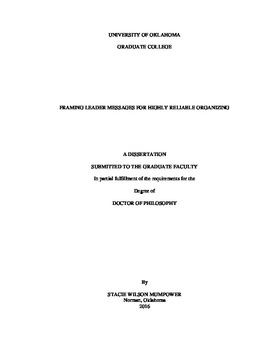| dc.description.abstract | This dissertation tests high-reliability organization (HRO) theory's claim that strategic leadership messages can direct followers’ sensemaking in adaptive ways (Weick & Sutcliffe, 2015). Specifically, two experiments tested whether mindfulness-based leader language choice enhanced followers' performance during a planning task. The experiments also tested the relationship between leader language choice and followers' willingness to speak up with dissent—an outcome known to be prominent in mindful, learning organizations (Kassing, 2011). In the first experiment, working adults (N = 197) in a single high-reliability organization (i.e., U.S. Army) read one of four leader message conditions prior to engaging in a scenario planning task. Leader message conditions varied by framing density, mindfulness language, and optimism. Results indicated no significant differences between leader message treatments for any of the predicted outcomes—self-reported feelings of mindfulness, participants’ performance during a planning task, and willingness to speak up with dissent.
A second experiment was conducted to answer whether mindfulness-based leader messages are influential in the case of a general working adults sample (N = 481). Results did, indeed, indicate statistically significant differences in participants' performance during a planning task. Specifically, participants generated more numerous contingencies during planning when exposed to the framing- and mindfulness-dense leader message as compared with an optimistic leader message. Furthermore, participants generated significantly higher quality contingencies during planning when exposed to a mindfulness-based leader message dense with metaphors as compared with participants who received a leader message with few or no metaphors to reinforce the need for mindfulness. Finally, consistent with HRO theorizing, participants exposed to an optimistic leader message produced significantly lower quality contingencies during planning as compared with participants who received a mindfulness-based leader message. Results indicated no significant differences between leader message treatments for self-reported feelings of mindfulness or willingness to speak up with dissent. A post-hoc analysis was conducted to compare the two samples. Again, consistent with HRO theorizing, results indicated that participants drawn from a single high-reliability organization performed better on the planning task than participants sampled from a general working adult population, regardless of leader message condition.
This dissertation contributes to organizational communication literature in three primary ways: First, results confirmed leadership communication can, indeed, stimulate followers’ adaptive sensemaking, which can be seen in improved performance during a planning task. Second, this research is consistent with HRO theorists' claim that lessons drawn from HROs are transferable for improving the performance of working adults outside the HRO context. Third, the observation that participants from the single HRO outperformed their general working adult counterparts on the planning task supported the notion that mindfulness is, in fact, being routinized by their HRO culture. The dissertation concludes with practical recommendations for leadership communication practice. | en_US |
